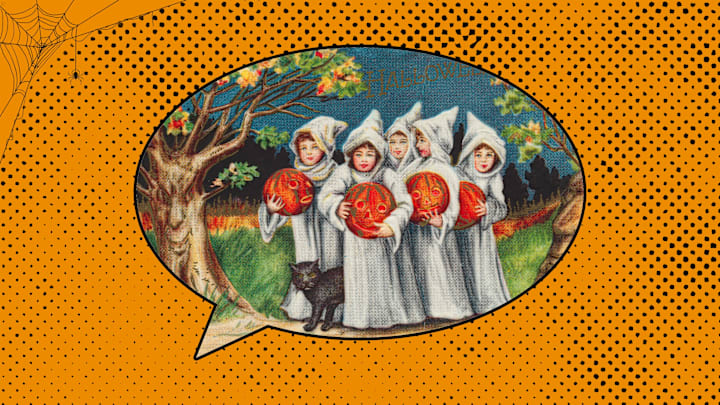Tricks aren’t just for kids anymore—nor are trick words! Here are 11 old-timey words for pranks and capers, perfect for when you’re feeling curmudgeonly about Halloween revelers knocking on your door for treats.
1. Humbug
Before humbug was Ebenezer Scrooge’s catchphrase, it meant a hoax or trick. The exact origin of the word, which became popular in the mid-1700s, is unknown, according to the Oxford English Dictionary (OED).
2. Capriccio
“Candy or capriccio!” kids might be saying today if the trick sense of this word had stuck around. Italian in origin, capriccio may ultimately come from capro, or “goat,” referring to the way the animal skips around. (Capro may also give us the fickle-minded capricious.) These days, capriccio is more commonly used as a musical term meaning “lively in manner.”
3. Cantrip
This Scots term refers to both “a witch’s trick” (a.k.a., a spell or charm) and a playfully mischievous one, according to the OED.
4. Gum-game
If you try the gum-game on someone, you’re trying to cheat or trick them. This U.S. slang term was used in the latter half of the 19th century and probably comes from “the observation that opossums and raccoons often hide in a sweet-gum tree when hunted,” according to Merriam-Webster.
5. Marlock
This dialect word from northern England refers to a flirty glance or playful gesture as well as a prank. While the noun form fell out of use in the early 20th century, the verb meaning “to frolic or play about” still seems to be around.
6. Dido
No, not that Dido. From the early 19th to the early 20th centuries, dido was an American slang term for a prank or caper. While the official origin of the word is unknown, the Online Etymology Dictionary speculates it could come from the story of the mythical Queen Dido. Legend says she asked a local ruler, King Iarbas, for some land, and he agreed to give the amount that could be covered in a bull’s hide. Clever Dido had the hide cut into strips so it stretched around an important hill (later known as Byrsa, Greek for “hide”). The city she founded would become Carthage, one of the most influential metropolises of the ancient world.
7. Chicanery
This 16th-century word refers to quibbling or trickery, especially in a legal context. French in origin, it’s also the title of an episode of Better Call Saul—fitting for a show about a scammy lawyer.
8. Pettifoggery
A synonym for chicanery, the word pettifoggery originated in the mid-17th century. It comes from pettifogger, which refers to a sketchy lawyer, a novice who pretends to know all, or someone who quibbles over small things. The petti– in pettigfogger comes from (you guessed it) petty, which in turn comes from the French word petit, or “small,” while fogger may come from the name Fugger.
Who were the Fuggers? They were a wealthy 16th-century family of “merchants and financiers,” according to Merriam-Webster; the OED notes that they “were widely criticized for unethical business practices.” Hence, fugger came to refer to hucksters as well as, specifically, a “low-ranking lawyer who abuses the law,” per the OED.
9. Skulduggery
“What skulduggery is this!” you can shout the next time you’re met with some trickery. This American term first came about around the 1860s; its origin, however, is largely a mystery. All we know, according to Merriam-Webster, is that it has nothing to do with skulls, and may come from sculduddery, meaning something “lewd” or “obscene.” No one knows where that word comes from, either.
10. Rannygazoo
Or is it granny kazoo? This tricky piece of U.S. slang, which also referred to nonsense, originated in the late 19th century, and was sometimes spelled rannikaboo and renicky-boo. English writer P.G. Wodehouse, who lived in the U.S. for many years, popularized the spelling rannygazoo.
11. Phonus-bolonus
Why say phony baloney about some nonsense, fraud, or trickery when you can say phonus-bolonus? While the former is more common, the latter is an older term; its earliest citation in the OED is from 1929 and comes courtesy of American writer Damon Runyon: “Of course this message is nothing but the phonus bolonus.” Phony baloney’s earliest mention, meanwhile, is from 1933.
